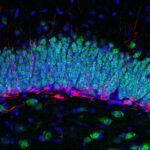Lien vers Pubmed [PMID] – 29030432
J. Neurosci. 2017 Oct;
Classical and systems genetics have identified wide networks of genes associated with cognitive and neurodevelopmental diseases. In parallel to deciphering the role of each of these genes in neuronal or synaptic function, evaluating the response of neuronal and molecular networks to gene loss-of-function could reveal some pathophysiological mechanisms potentially accessible to non-genetic therapies. Loss of function of the Rho-GAP Oligophrenin-1 is associated with cognitive impairments in both human and mouse. Up-regulation of both PKA and ROCK has been reported in Ophn1(-/y) mice, but it remains unclear if kinase hyperactivity contributes to the behavioural phenotypes. In this study, we thoroughly characterized a prominent perseveration phenotype displayed by Ophn1 deficient mice using a Y-maze spatial working memory (SWM) test. We report that Ophn1 deficiency in the mouse generated severe cognitive impairments, characterized by both a high occurrence of perseverative behaviours and a lack of deliberation during SWM test. In vivo and in vitro pharmacological experiments suggest that PKA dysregulation in the mPFC underlies cognitive dysfunction in Ophn1 deficient mice, as assessed using a delayed spatial alternation task results. Functionally, mPFC neuronal networks appeared to be affected in a PKA-dependent manner, whereas hippocampal-PFC projections involved in SWM were not affected in Ophn1(-/y) mice. Thus, we propose that discrete gene mutations in intellectual disability might generate “secondary” pathophysiological mechanisms, which are prone to become pharmacological targets for curative strategies in adult patients.SIGNIFICANCE STATEMENTHere we report that Ophn1 deficiency generates severe impairments in performance at spatial working memory tests, characterized by a high occurrence of perseverative behaviours and a lack of decision making. This cognitive deficit is consecutive to PKA deregulation in the mPFC that prevents Ophn1 KO mice to exploit a correctly acquired rule. Functionally, mPFC neuronal networks appear to be affected in a PKA-dependent manner, whereas behaviourally important hippocampal projections were preserved by the mutation. Thus, we propose that discrete gene mutations in intellectual disability can generate “secondary” pathophysiological mechanisms prone to become pharmacological targets for curative strategies in adults.

